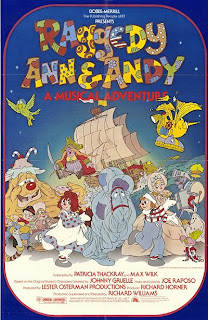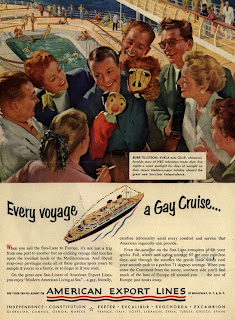Wise: Werth, I noticed today's Film Gab title and I just want you to know that I will not be posing with you stretched over the bow of a ship.
Werth: Trust me, Wise. I won't let you fall in our filmic tribute to the April 4th 3D release of the second biggest movie moneymaker of all time.
Wise: In which Kate Winslet shows her own two biggest moneymakers.
Werth: Being an historic obsessive about the Titanic tragedy, I was impressed by James Cameron's attention to detail and the beauty of the ship—not to mention getting my glasses all wet as I projectile boo-hoo'ed when the ship went down.
Wise: While the Titanic story may be the most famous, plenty of other ships have made appearances in great movies... and also in some not-so-great movies, like Raggedy Ann & Andy: A Musical Adventure (1977).
Werth: Wise, we're talking about one of the most successful disaster films of all time and you bring up a kiddie flick about dolls.
Wise: It may be a kid flick, but it was a huge disaster, prominently features a pirate ship, plus it sank at the box office as soon as it arrived in theaters. And—as you well know—I'll use any excuse to talk about insane kid movies.
Werth: Well, when you put it that way...
Wise: The film opens on Marcella's seventh birthday and all the toys in the playroom are curious about the enormous present that has arrived from Paris. After the package is opened and pouty porcelain poupée Babette is introduced, a pirate captain escapes from his snow globe, kidnaps the new doll, and sails away in his sea rover. Raggedy Ann and Andy then set out to rescue Babette and save Marcella's birthday.
Werth: Please tell me Marcella takes them on the maiden voyage of the R.M.S. Titanic... in third class.
Wise: Oh, believe me, even the Carpathia wouldn't have picked up this bedraggled mess. Raggedy Ann had been a beloved character since she was first introduced by Johnny Gruelle in 1915, but aside from a couple animated shorts in the early 1940's, she had languished as a toy and a moderately successful publishing enterprise for many years. In the 1970's, however, the popularity of Ann and her brother Andy was on the rise, and The Bobbs-Merrill Company, which owned the rights to the characters, was anxious to bring them to an even wider audience.
Werth: It's strange to think that the decade that brought us KISS and Star Wars also brought us this red-haired bag of fluff.
Wise: Because Bobbs-Merrill had such high hopes for the project, they enlisted some top talent: Muppet collaborator Joe Raposo to write the music; a pre-Grease Didi Conn as the voice of Ann; and a host of animators from the Golden Age of Disney and Warner Bros. to bring the characters to life.
But despite this surplus of skill, the film is a wreck with underdeveloped characters, an overabundance of songs, plus the most trippily psychedelic sea of living taffy you can imagine.
Werth: I would need psychedelics to sit through it...
Wise: Director Richard Williams (who went on to win an Oscar for directing the animation in Who Framed Roger Rabbit?), fought endlessly with the producers trying to get a better script and more time for the animators to work, but was forced from the project when the producers grew tired of delays. That contentiousness reveals itself in the final film where most of the minor characters are unappealing, if not downright repulsive.
Still, there are some wonderful moments like the transition from the live-action frame story to the animated middle where the toys come to life and the wonderfully absurd Camel with the Wrinkled Knees. It's not a great movie—not even a good one—but in some ways it predicted the phenomenal success of the Toy Story franchise, and it sticks with me as a sentimental favorite.
Werth: One of my favorite boat movies isn't always remembered as such. The Empire State Building bogarts most of the attention in Leo McCarey's An Affair to Remember (1957), but the majority of the action takes place on a transatlantic cruise aboard the S.S. Constitution. Cary Grant plays Nickie Ferrante a frustrated playboy who isn't finding life in the fast-lane all that fulfilling.
Wise: Swanning around in a tuxedo is definitely hard work.
Werth: Enter the lovely Deborah Kerr as Terry McKay, a former nightclub singer whose no nonsense approach to life should repel Mr. Ferrante and his expensive cigarette case— but of course, it doesn't. Love blossoms as the two flirt and canoodle from stem to stern being careful to be discreet, because both of them are already publicly involved with someone else.
Wise: Why are the best ones always taken?
Werth: A shore-leave excursion to the enchanted Mediterranean garden and home of Nickie's grandmother (Cathleen Nesbitt) seals the deal and by the end of the cruise Nickie and Terry have realized that what was missing in their lives was each other.
So the two set a date six months later, and if they have dumped their current sugar-daddy/mommy and found a way to earn their own money, they will meet at the top of the Empire State Building to live happily ever after.
Wise: But everyone knows that doesn't happen.
Werth: Yes, thanks to spoilers from Tom Hanks and Co. everyone knows that the two don't meet at the Empire State Building.
But what is really memorable about Affair is what happens after Nick leaves the ESB alone. The crippling doubt coupled with unlikely hope gives the film an emotional depth other happy-ending romances just don't have. And with the impeccable Grant and Kerr on board, this is one ship movie that I want to sail on over and over.
Wise: Unless we hit an iceberg, we'll be sailing full speed ahead to next week's Film Gab!
Werth: So, Wise...
Wise: Yes, Werth?
Werth: The smoke from Sacha Baron Cohen's Oscar prank has finally cleared and the winners have stumbled home with their goodie bags from various and sundry Oscar fetes.
Wise: And it's time for us to salute those who didn't get to go home with a golden statuette.
Werth: Last year, we examined actresses in iconic roles whose dreams of Oscar glory were crushed by the Academy, and in honor of the three legendary directors who got the sharp end of the stick this year, let's take a look at directors who failed in the quest for the film industry's most prized phallic symbol.
Wise: No director springs to mind faster than Martin Scorsese whose Hugo spent most of the awards season neck and neck with Michel Hazanavicius' The Artist only to lose in the final tally.
Werth: And who got shout-outs and thank you's all night long—not to mention becoming the cue for a drinking game for Rose Byrne and fellow Oscar-loser Melissa McCarthy.
Wise: But it's an earlier Scorsese film that seems an even more egregious loss. The Aviator (2004) isn't very much like the films of Scorsese's maverick 70's heyday, but it does reveal a remarkably sure directorial hand, plus it was his fifth nomination in the category. Those two facts combined made him look like a shoo-in for the prize—
Werth: Because if the Academy loves anything more than giving Best Supporting Actress to a one hit wonder, it's presenting a Hollywood institution an award for later, and lesser, work.
Wise: Perhaps The Aviator wasn't lesser enough because Scorsese turns what could have been a run-of-the-mill bio-pic of legendary millionaire/germaphobe Howard Hughes into an epic history of Hollywood that's also a meditation on the costs of ambition. Leonardo DiCaprio stars as Hughes, and his twitchy energy brings humanity to a life that had been flattened into caricature by rumor and tall tales.
Werth: That and Jane Russell's rack.
Wise: Of course the stand-out—and Oscar winning—performance is Cate Blanchett as Katherine Hepburn. Taking what could have been an opportunity for cloying mimicry of a Hollywood legend, Blanchett imbues the movie Kate with passion and tenderness in a performance that feels more like a revelation than an impersonation.
Werth: She was so good, I honestly wanted to leave Hughes when she did and watch Blanchett play the rest of Kate's life.
Wise: Nowhere are Scorsese's talents more apparent than in the visual vocabulary of the film. Using the evolution of photography (from garish two-strip Technicolor to the lush hues of the 40's to the lurid spectrum of 50's spectacle), Scorsese not only signals the passage of time, but also the progress and eventual deterioration of his subject's mind.
There are nods throughout to classic Hollywood films, but nostalgia didn't work for Scorsese (losing to Clint Eastwood's Million Dollar Baby) until he produced an imitation of his own best work, finally winning Oscar gold for The Departed two years later.
Werth: Scorsese wasn't alone this year in having to eat The Artist's dust in the Best Director category. No less than Terrence Malick and Woody Allen (neither of whom deigned to show up) had to eat Oscar crow. And usual Oscar darling Steven Spielberg didn't even get nominated.
Wise: I guess horses and comic books don't have the same dramatic heft as American slavery and the Holocaust.
Werth: It reminds me of the 17th Academy Awards held in March, 1945. Otto Preminger (Laura), Billy Wilder (Double Indemnity) and Alfred Hitchcock (Lifeboat) lost to Leo McCarey's Bing Crosby-starring love letter to the Catholic church, Going My Way. Now, McCarey was a fine comedy director, but aside from the occasional Sunday hangover TCM viewing, Going My Way holds little of the regard that the other three films do.
Wise: Nor does it have Bob Hope or Dorothy Lamour—two of my favorite hangover cures.
Werth: I'm particularly fond of Lifeboat. Hitchcock had already made quite a name for himself with several American films like Rebecca (1940) and Shadow of a Doubt (1943), but Lifeboat's style holds glimpses of some of his future filmwork like Rope (1948), Dial M for Murder (1954) and Rear Window (1954). The setting of Lifeboat is—a lifeboat. There are no cutaway shots to other sets, or a family waiting back home, or flashbacks to a happier time. Hitchcock forces us to join a group of castaways after their liner is sunk by a German U-boat by trapping us with his camera. There is nowhere for these survivors to run in the open sea, and by limiting all but a couple of the camera shots to the boat, the visual claustrophobia makes us as stir crazy as this motley crew. And what a crew!
Wise: Please tell me there isn't a Skipper or Gilligan among them.
Werth: More like a Mrs. Howell. Tallulah Bankhead as reporter and bon vivante Connie Porter gives the best screen performance of her storied career. Her droll line deliveries (in English and German) and cigarette gesticulation are mesmerizing. And since she's got some free time on this boat, why not seduce the handsomest sailor (John Hodiak) aboard?
Wise: Why not indeed?
Werth: The cast is full of fantastic character actors like William Bendix, Hume Cronyn and Walter Slezak, and it's really surprising how many sharp plot twists writer John Steinbeck pulled out of such a little boat. All told Lifeboat is much more fun to watch than Der Bingle buh-buh-buh-booing through a Catholic boy's school.
Wise: That'll get you in trouble these days.
Werth: But back then it got him an Oscar for Best Actor—and in this week's blog, being a winner makes him a real loser.
Wise: We'll discuss more Tinseltown winners and losers in next week's edition of Film Gab.



























